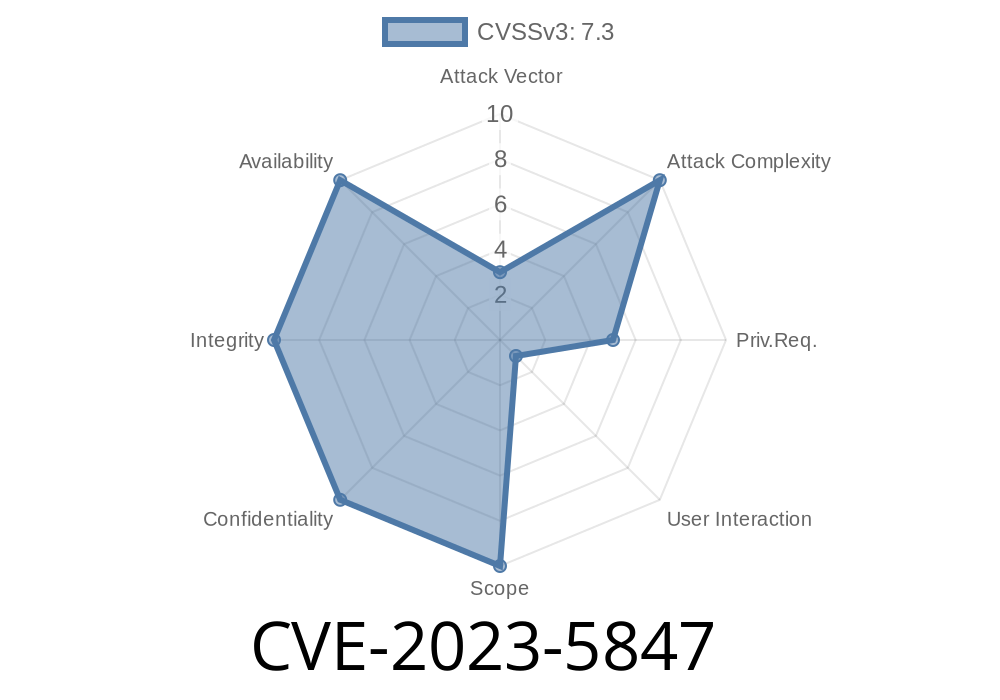CVE-2023-5847 is a critical vulnerability allowing a low-privileged attacker to escalate their privileges on both Windows and Linux systems. The issue surfaces during the installation or upgrade process, where certain software does not securely handle user-supplied files. An attacker only needs to place a malicious file in a location where the software expects legitimate content—often with little or no user interaction needed.
This vulnerability gives attackers a straightforward path to obtain admin or root access, making it a high-priority risk for anyone managing affected systems.
How Does It Work?
The key flaw behind CVE-2023-5847 is insufficient validation of files during installation and upgrade routines. When a system or application installs or updates, it might process files from directories writable by regular users. If an attacker can place a specially crafted file where it will be processed, their malicious payload gets executed with elevated permissions.
The Attack Path
1. Low Privileged Access: The attacker obtains access to a standard (non-admin / non-root) user account.
2. Malicious File Placement: The attacker creates and places a crafted file in a location referenced by the installer/upgrader—common spots include public directories or temporary folders.
Trigger: The legitimate user (or admin) runs an install or upgrade.
4. Privilege Escalation: The installer reads and executes the attacker's file with elevated privileges, giving them system-wide control.
Code Snippet – The Linux Example
Below is a simplified example for Linux. Imagine an installation script that blindly executes a user-owned script during upgrade:
installer.sh (vulnerable logic)
#!/bin/bash
# Installer script that sources a script from /tmp
# This is unsafe if /tmp is world-writable!
if [ -f /tmp/install_helper.sh ]; then
source /tmp/install_helper.sh
fi
echo "Installation complete."
If a low-privileged attacker manages to place /tmp/install_helper.sh before an admin runs this installer, their code will run as root:
(Attacker’s) /tmp/install_helper.sh
#!/bin/bash
# Evil payload to create a root shell
cp /bin/bash /tmp/.rootshell
chmod +s /tmp/.rootshell
Now the attacker can run /tmp/.rootshell and get a root shell prompt.
PowerShell Example
# Installer executes helper from public writable directory (bad practice)
$helper = "C:\ProgramData\install_helper.exe"
if (Test-Path $helper) {
Start-Process $helper -Verb runAs
}
If the attacker places their malicious install_helper.exe first, it will run with administrator rights during installation.
Fixes & Mitigation
- Do Not Execute Unsigned/Unverified Files:
Avoid Using User-Writable Directories:
Do not source or execute files from locations that non-privileged users can write to, like /tmp, %TEMP%, or C:\ProgramData.
Monitor and Clean Temporary Folders:
Before upgrade/install, remove potentially malicious files.
References
- NIST NVD Entry for CVE-2023-5847
- Exploit-DB Reference (if available)
- Mitigation Best Practices (External)
- OWASP Secure Installation Guidelines
Exploit Details and Real-World Risk
In a real-world scenario, attackers frequently use this privilege escalation technique as part of broader attacks:
Gaining an initial foothold (social engineering or phishing)
- Waiting for scheduled upgrades/patches to execute their malicious files
- Gaining persistent root/system user access
The exploit is especially dangerous for shared systems (multi-user Linux servers, shared Windows desktops) and scenarios where non-admin users can access temporary or public directories.
PoC Recap
- Place a script or executable in a target’s writable temp/public directory
- Wait for an upgrade/installation
- Gain root/admin
Simple, fast, and often goes undetected until it’s too late.
Conclusion
CVE-2023-5847 highlights how installation and upgrade routines can become high-value targets for attackers, especially when file validation and permissions are neglected. Always audit install scripts, use secure file handling, and restrict permissions to reduce the risk of privilege escalation.
Stay vigilant, and make sure your installation processes aren't an open door for attackers.
*If you liked this breakdown, share it with your sysadmin friends and subscribe for more security insights! Have a question about CVE-2023-5847? Add it in the comments!*
Timeline
Published on: 11/01/2023 16:15:08 UTC
Last modified on: 11/14/2023 18:55:45 UTC
